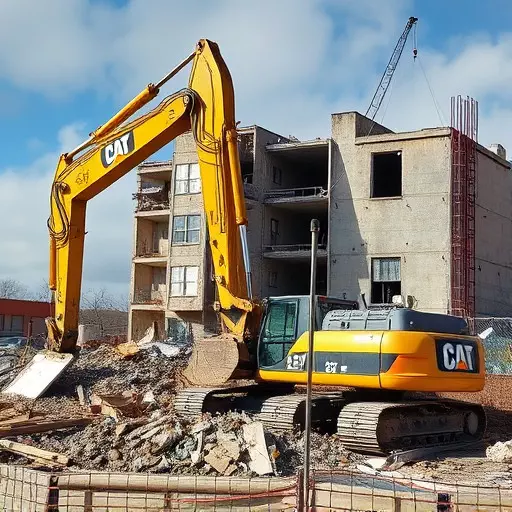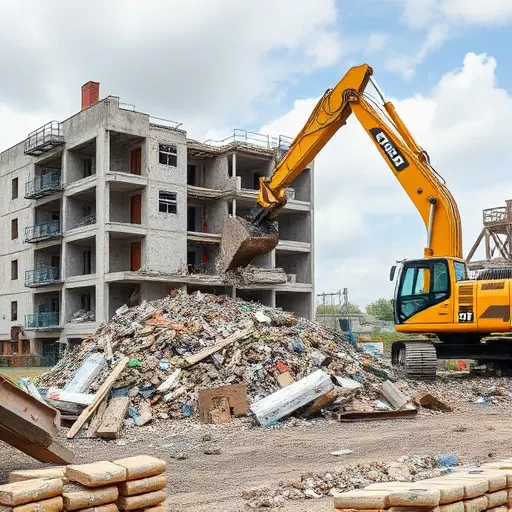Asbestos removal in Toledo requires professional demolition and recycling services due to its hazardous nature. These services safely handle, remove, and dispose of asbestos during construction site demolition and building deconstruction, adhering to strict regulations. They employ specialized techniques, trained personnel, and advanced machinery to mitigate risks and minimize environmental impact. Choosing licensed experts ensures comprehensive assessment, careful removal, proper disposal, and eco-friendly recycling practices, vital for both safety and sustainability in the industry.
Asbestos removal is a critical task that requires expert knowledge and stringent safety measures. In today’s world, understanding the risks associated with asbestos exposure is paramount for maintaining healthy environments, especially in urban construction sites. This article explores comprehensive solutions for effective asbestos management, including the role of demolition in safe removal, disposal practices, and deconstruction techniques. We delve into the selection of reliable removal companies and highlight modern recycling technologies, drawing from real-world case studies to provide a holistic guide for successful asbestos handling, particularly focusing on services in Toledo, Ohio.
- Understanding Asbestos: Risks and Regulations
- The Role of Demolition in Asbestos Removal
- Safe Disposal Practices for Construction Sites
- Deconstructing Buildings: A Step-by-Step Process
- Choosing the Right Asbestos Removal Company
- Modern Technologies in Asbestos Recycling
- Case Studies: Successful Asbestos Management Projects
Understanding Asbestos: Risks and Regulations
Asbestos is a highly hazardous material that was commonly used in construction materials due to its fire-resistant properties. However, its detrimental health effects have led to stringent regulations and its eventual ban in many countries. Today, proper handling and removal of asbestos are crucial aspects of construction site demolition and building deconstruction.
When it comes to demolition and recycling services in Toledo or any construction project, it’s essential to understand that asbestos exposure can cause severe respiratory illnesses like mesothelioma and asbestosis. Therefore, professional asbestos removal services are required for safe disposal and recycling of materials containing this hazardous substance. These services employ specialized equipment and trained personnel to navigate the challenges associated with asbestos, ensuring compliance with local regulations and protecting the health of workers and surrounding communities.
The Role of Demolition in Asbestos Removal
In many cases of asbestos removal, especially in older buildings undergoing renovation or redevelopment, demolition plays a pivotal role. Asbestos is often discovered during deconstruction processes when materials such as insulation, flooring, and roofing are removed. Professional demolition and recycling services in Toledo can ensure that these hazardous materials are handled with the utmost care and safety protocols.
Building deconstruction involves meticulous planning and specialized techniques to safely disassemble structures while identifying asbestos-containing materials (ACMs). This process allows for more precise containment and removal, reducing the risk of exposure during the demolition cycle. By enlisting experienced contractors, construction sites can be prepared properly, minimizing disruptions and maximizing efficiency in both the deconstruction and subsequent recycling or disposal of ACMs.
Safe Disposal Practices for Construction Sites
When it comes to construction sites, safe disposal practices are paramount, especially when dealing with hazardous materials like asbestos. As a leading provider of demolition and recycling services in Toledo, our team understands the critical nature of proper asbestos removal. We adhere to stringent industry standards and regulations to ensure the safety of our workers and the surrounding environment during every step of the process.
Our comprehensive building deconstruction services involve carefully identifying and separating materials containing asbestos before initiating any demolition work. This meticulous approach allows for secure containment, proper packaging, and subsequent disposal at licensed facilities. By integrating eco-friendly recycling techniques, we minimize the environmental impact while contributing to a sustainable future.
Deconstructing Buildings: A Step-by-Step Process
When it comes to asbestos removal, a meticulous deconstruction process is essential for safe and effective disposal. This involves several careful steps, especially when handling older buildings that may contain asbestos materials. The journey starts with a comprehensive assessment by licensed professionals who identify potential asbestos hotspots. Once located, these hazardous materials are carefully cut, stripped, and removed, ensuring minimal disturbance to the rest of the structure.
The deconstruction process often includes specialized equipment and techniques to prevent asbestos fibers from spreading. After removal, materials are sorted for recycling or responsible disposal. Many companies in Toledo offering demolition and recycling services specialize in building deconstruction, providing eco-friendly solutions for construction sites by minimizing waste and promoting sustainable practices.
Choosing the Right Asbestos Removal Company
When it comes to asbestos removal, selecting the right company is paramount for ensuring a safe and effective process. Look for professionals offering comprehensive services that extend beyond simple removal. The ideal contractor should provide expertise in demolition and recycling, especially tailored for projects involving construction site demolition or building deconstruction. This ensures that not only is the asbestos handled safely and in accordance with regulations, but also that the materials are recycled responsibly, contributing to a greener environment.
In Toledo, access to quality asbestos removal services is essential due to the potential presence of this hazardous material in older buildings. Reputable companies will have the necessary licenses and certifications, as well as trained personnel equipped to handle all phases, from assessment and containment to actual removal and disposal. Always inquire about their methods, experience, and adherence to safety standards to make an informed decision for your project’s unique needs.
Modern Technologies in Asbestos Recycling
In recent years, modern technologies have significantly advanced the field of asbestos removal and recycling, especially in services like demolition and recycling in Toledo for construction sites and building deconstruction. Innovative equipment and processes are now available to handle this hazardous material more safely and efficiently. One notable development is the use of specialized machinery designed to minimize exposure during the removal process, ensuring the well-being of workers and the environment.
Additionally, advanced sorting technologies enable more precise separation of asbestos from other materials, enhancing recycling efficiency. These modern approaches not only facilitate proper disposal but also contribute to a circular economy by repurposing asbestos components in new products. As construction sites and old buildings undergo deconstruction, these technologies play a crucial role in transforming a once-harmful substance into valuable resources, aligning with sustainability goals in the building industry.
Case Studies: Successful Asbestos Management Projects
In recent years, successful asbestos management projects have showcased the critical role of professional demolition and recycling services in Toledo. These case studies highlight the meticulous process of safely removing asbestos from construction sites and buildings undergoing deconstruction. For instance, a local school district partnered with experts to abate asbestos in an old educational facility. Through careful planning and execution, they successfully removed hazardous materials while minimizing disruption to ongoing academic activities.
Another notable project involved the demolition of an industrial building where asbestos insulation was prevalent. The process entailed a comprehensive assessment, containment strategies, and adherence to strict safety protocols. The recycled asbestos materials were properly disposed of, ensuring environmental compliance. These examples underscore the expertise required in managing asbestos during construction site demolition and building deconstruction projects.


